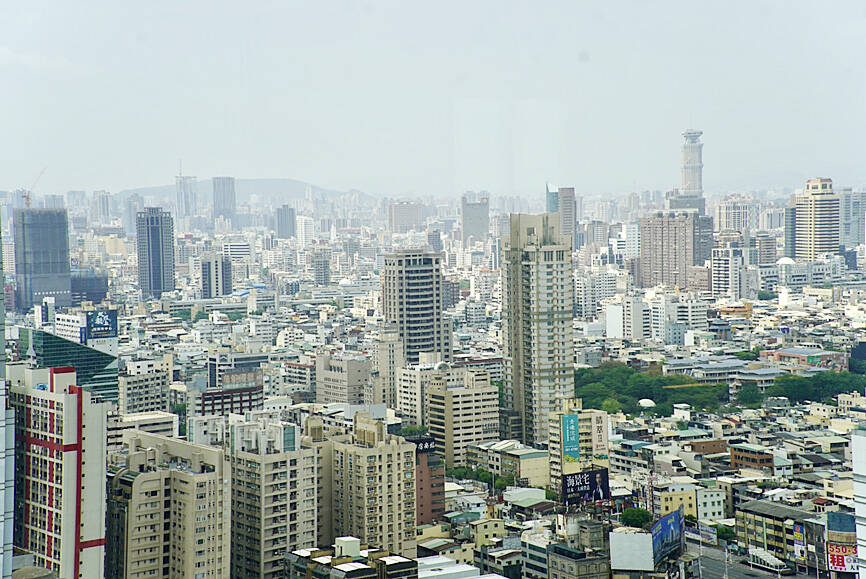The housing market might remain soft, but a hard landing is unlikely after the Ministry of the Interior on Tuesday promulgated complimentary measures to bans on transfers of presale housing purchase agreements, analysts said.
The ministry proposed the complimentary measures after the Legislative Yuan passed amendments to the Equalization of Land Rights Act (平均地權條例) in January, as it seeks to curb speculation in the presale property market and set heavy fines for market manipulation.
Luxury home sales would likely take a hit as the amendments require “private legal entities” — including private organizations and nonprofit groups — to obtain regulatory approval before buying real estate and bars them from reselling property within five years.

Photo: CNA
Meanwhile, a reward mechanism for whistle-blowers to report potential fraud or other illegal housing transactions would be created, the amendments say.
The bans and unfavorable regulations in the amendments have added pressure to the presale housing market, with transfers of presale contracts plunging to NT$85 billion (US$2.77 billion) in February from a monthly average of NT$180 billion in the final quarter of 2021, Sinyi Realty Inc (信義房屋) said.
The bans, which take effect 20 days after promulgation, would not limit purchases of presale houses to buyers with real demand, but short-term investors would likely exit the market, Sinyi research manager Tseng Ching-der (曾敬德) said in a statement on Tuesday.
Tseng said the bans would stretch resale deals, although they are not retroactive and would not affect existing purchase agreements.
The bans include exemptions for sellers with compelling reasons such as prolonged unemployment, critical illness, death and other major economic changes, he added.
Great Home Realty Co (大家房屋) head researcher Mandy Lang (郎美囡) agreed, saying the market has largely factored in the restrictions, with property transactions continuing to fall from the second half of last year.
However, H&B Realty Co (住商不動產) chief researcher Jessica Hsu (徐佳馨) voiced concern that cash-strained developers might exit the market after the amendments take effect, leaving presale house buyers at a loss.
Regarding the outlook for housing prices, Sinyi last week released a survey showing that up to 51 percent of the 1,150 respondents expected prices to fall this quarter, the highest percentage since the second quarter of 2020.
The survey conducted between March 15 and 22 found that 21 percent of respondents expected prices to rise this quarter, while 28 percent said prices would remain flat from last quarter.
However, a survey by Cathay Financial Holding Co (國泰金控) conducted from April 1 to 7 showed that 52 percent of the 14,489 respondents expected housing prices to continue to rise more than 3 percent over the next six months, despite several central bank interest rate increases since March last year.
Additional reporting by Kao Shih-ching

UNCERTAINTY: Innolux activated a stringent supply chain management mechanism, as it did during the COVID-19 pandemic, to ensure optimal inventory levels for customers Flat-panel display makers AUO Corp (友達) and Innolux Corp (群創) yesterday said that about 12 to 20 percent of their display business is at risk of potential US tariffs and that they would relocate production or shipment destinations to mitigate the levies’ effects. US tariffs would have a direct impact of US$200 million on AUO’s revenue, company chairman Paul Peng (彭雙浪) told reporters on the sidelines of the Touch Taiwan trade show in Taipei yesterday. That would make up about 12 percent of the company’s overall revenue. To cope with the tariff uncertainty, AUO plans to allocate its production to manufacturing facilities in

TAKING STOCK: A Taiwanese cookware firm in Vietnam urged customers to assess inventory or place orders early so shipments can reach the US while tariffs are paused Taiwanese businesses in Vietnam are exploring alternatives after the White House imposed a 46 percent import duty on Vietnamese goods, following US President Donald Trump’s announcement of “reciprocal” tariffs on the US’ trading partners. Lo Shih-liang (羅世良), chairman of Brico Industry Co (裕茂工業), a Taiwanese company that manufactures cast iron cookware and stove components in Vietnam, said that more than 40 percent of his business was tied to the US market, describing the constant US policy shifts as an emotional roller coaster. “I work during the day and stay up all night watching the news. I’ve been following US news until 3am

Taiwan will prioritize the development of silicon photonics by taking advantage of its strength in the semiconductor industry to build another shield to protect the local economy, National Development Council (NDC) Minister Paul Liu (劉鏡清) said yesterday. Speaking at a meeting of the legislature’s Economics Committee, Liu said Taiwan already has the artificial intelligence (AI) industry as a shield, after the semiconductor industry, to safeguard the country, and is looking at new unique fields to build more economic shields. While Taiwan will further strengthen its existing shields, over the longer term, the country is determined to focus on such potential segments as

COLLABORATION: Given Taiwan’s key position in global supply chains, the US firm is discussing strategies with local partners and clients to deal with global uncertainties Advanced Micro Devices Inc (AMD) yesterday said it is meeting with local ecosystem partners, including Taiwan Semiconductor Manufacturing Co (TSMC, 台積電), to discuss strategies, including long-term manufacturing, to navigate uncertainties such as US tariffs, as Taiwan occupies an important position in global supply chains. AMD chief executive officer Lisa Su (蘇姿丰) told reporters that Taiwan is an important part of the chip designer’s ecosystem and she is discussing with partners and customers in Taiwan to forge strong collaborations on different areas during this critical period. AMD has just become the first artificial-intelligence (AI) server chip customer of TSMC to utilize its advanced